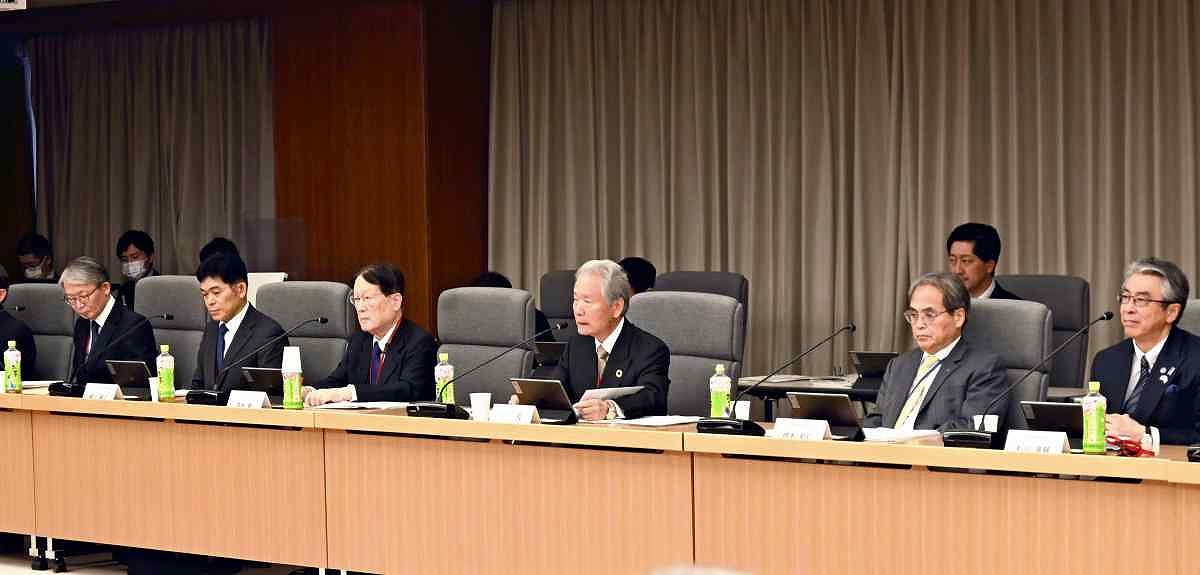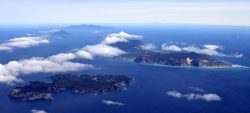Joint Defense Development Urged In Public, Private Sectors; ‘Dual-Use’ Technologies Expected to Aid Economic Growth

Members of an expert panel on drastically strengthening defense capabilities are seen at the committee’s first meeting on Monday.
21:00 JST, February 20, 2024
At the first meeting of an expert panel on Monday, some participants raised the need to link the strengthening of Japan’s defense to economic growth through aggressive investment in science and technology.
“It’s necessary to strengthen coordinated technological development between the public and private sectors that could affect demand in the private sector and help achieve economic growth,” panel chair Sadayuki Sakakibara, former chairman of the Japan Business Federation (Keidanren) said at the meeting.
A total of ¥3.5 trillion from state coffers is planned to be invested in defense-related research and development over a period of five years starting fiscal 2023. This is more than four times the level of the government’s previous defense buildup program.
To promote the development of dual-use technologies, the government’s Acquisition, Technology and Logistics Agency will establish a new research institute in fiscal 2024. It plans to hire human resources from private companies and universities.
In recent years, many countries have used cooperation between the public and private sectors to be competitive in the research and development of drones and artificial intelligence. Japan too must have cooperation beyond the boundaries of industry, government and academia.
The Defense Ministry is encouraging startup companies to enter the defense business, hoping to utilize advanced technologies from the private sector to strengthen defense capabilities. It is also working to revitalize the semiconductor industry, which is essential for defense equipment.
Delay in building systems
Regarding implementation of the three fundamental documents on defense, there has been some progress such as the introduction of U.S.-made Tomahawk cruise missiles one year ahead of the original schedule for counterattack capabilities. The Self-Defense Forces are scheduled to start deploying those missiles in fiscal 2025.
However, with regard to public-private partnerships, there have been some delays in the creation of systems to strengthen measures on cyber security and relax the restriction on the export of defense equipment.
The National Security Strategy included the introduction of an “active cyber defense.” However, the government failed to submit related bills to the current Diet session. This is partly because studies of the issue are taking time, due to potential conflict with the “secrecy of any means of communication” guaranteed by the Constitution.
More discussions urged
The security strategy also stated the government’s policy to strengthen its economic and fiscal foundation, recognizing the “critical importance” of having adequate fiscal capacity to secure the necessary funds, with an eye on a contingency involving Taiwan.
Japan’s national debt, including government bonds, amounted to about ¥1,270 trillion at the end of fiscal 2022. In the event of an emergency, interest rates could soar and debts could snowball, making it essential to strengthen the nation’s financial base.
However, there is no prospect for deciding when to increase income, corporate and tobacco taxes to finance defense programs. The administration of Prime Minister Fumio Kishida is facing growing headwinds due to the scandal involving hidden funds among political factions of the ruling Liberal Democratic Party.
Regarding financial resources for defense programs, Sakakibara said at the meeting, “The financial burden on the public and detailed sources of funds should be discussed again in earnest.”
¥43 trillion may be insufficient
The five-year total defense budget is planned to be around ¥43 trillion amid an estimated ¥108 to the U.S. dollar. However, the estimation has been severely challenged by the recent depreciation of the yen against the dollar.
The government recalculated the defense-related budget at ¥139 to the dollar in the fiscal 2024 budget proposal, but the level of yen depreciation has recently progressed to around ¥150.
“If this trend continues, it will become more difficult to achieve [planned objectives],” Kazuhisa Shimada, former administrative vice defense minister, said at the panel meeting. “It’s necessary to be flexible and consider revising the plan.”
Top Articles in Politics
-

Japan PM Takaichi’s Cabinet Resigns en Masse
-

Sanae Takaichi Elected Prime Minister of Japan; Keeps All Cabinet Appointees from Previous Term
-

Japan’s Govt to Submit Road Map for Growth Strategy in March, PM Takaichi to Announce in Upcoming Policy Speech
-

LDP Wins Historic Landslide Victory
-

LDP Wins Landslide Victory, Secures Single-party Majority; Ruling Coalition with JIP Poised to Secure Over 300 seats (UPDATE 1)
JN ACCESS RANKING
-

Producer Behind Pop Group XG Arrested for Cocaine Possession
-

Japan PM Takaichi’s Cabinet Resigns en Masse
-

Man Infected with Measles Reportedly Dined at Restaurant in Tokyo Station
-

Israeli Ambassador to Japan Speaks about Japan’s Role in the Reconstruction of Gaza
-

Videos Plagiarized, Reposted with False Subtitles Claiming ‘Ryukyu Belongs to China’; Anti-China False Information Also Posted in Japan
























